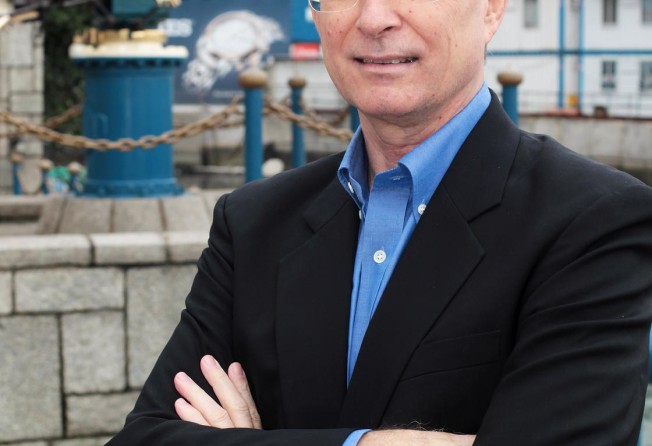
My life: Mike Smith
The former policeman tells Robby Nimmo about the corruption that infected the Hong Kong force in the 1970s, and where to fish locally


My parents were born expatriates. Mother was an American raised in Manila's colonial heyday; her father ran the port. When my parents moved to a tea plantation in India, they sent me to boarding school in England. I was seven when I arrived at Lancing College, which was also attended at the time by Raymond and Thomas Kwok. I used to commute on a BOAC Comet 4, the first passenger jet, which had to stop seven times between India and Heathrow. Of the first nine Comets built, five crashed.
At 19, I was looking for anything to get out of the UK. I sent in many applications, including to the British Army, Ben Line Steamers and the British South African police. The first reply was from the Hong Kong police force, which in 1973 was like a boy's own wonder world.
RATTLING THE CAGE I am not sure the police will like my book [ In the Shadow of the Noonday Gun]. A lot of my stories are set around Wan Chai, where I was based for two years in the CID [Criminal Investigation Department]. It was in the old days, when prisoners got beaten up and corruption was rife; pre-ICAC [Independent Commission Against Corruption]. Hong Kong has changed radically, and we're a better place for it. The culture then, inherited from the British Army, was that all police stations had an officers' mess. Senior officers often made junior officers go there after work. Drinking was a big part of the culture. I left the force in 1978, prompted partly by seeing officers retire in their 50s looking like they were nearly dead.
SLINGS AND ARROWS Back then, there was great uncertainty about China. They were firing verbal arrows across the border and the colony was firing them back. In my first few months in the force, I ranked No2 at Ta Kwu Ling [on the border]. Your morning would consist of accompanying an army officer and a team of troops to each border check point. The guy on the other side would stare you out, and then you'd stare him out. Then he'd bang his rifle down on the ground, and you'd bang your rifle down. Then you'd move onto the next crossing and do it again. This was only a few years after the Cultural Revolution and the handover wasn't on the radar. China wanted Hong Kong and Taiwan back. The thinking was that Taiwan would revert first, which we obviously got completely wrong.
YOUNG GUNS The force gave you awesome responsibility. As a kid, I was running a CID team, investigating murders and attacks. The chopper was the weapon of choice and there was an incident every week. I had no fear. Looking back, I should have had, because triads then were ruthless. [But] a lot of the things we saw were shocking and I wasn't immune. At times I wondered, "How do I deal with this?". I started officer training in April 1973. In the six months I was in training, the ICAC was established.
GOING STRAIGHT The ICAC instilled stability, but no one had any idea where it was headed. When I was at Wan Chai Police Station, we had about 30 sergeants in uniform; one day the ICAC arrested 29.
Organised corruption is easy to investigate; get one person talking and you have all the evidence you need. This was happening across the colony and the police couldn't function. Eventually, more than 5,000 police marched on ICAC headquarters. Governor [Murray] MacLehose had to confront the situation. Some may have been armed. He declared a clean slate for all police and other civil servants. He had no choice. There had been contingency plans to bring in the army, which could have been the end of Hong Kong.
Every week, everyone got an envelope on their desk containing double or treble their salary, for doing nothing. The corruption was just a weekly tithe that was taken on everything: restaurants, bars, brothels, opium divans. And cops were paying cops to get better jobs. Every single employee, from tea boy to the expatriate chief superintendent got a cut. Those who didn't take it were bullied in subtle ways. As their envelopes piled up, they'd suddenly find that life was a lot more awkward. It was just the system that existed. Breaking the back of corruption was a positive thing, and [helped] Hong Kong become the economic miracle it is today.
SPARE THE ROD I've had to dilute some of the stories [in the book] for legal reasons. I've tried to convey a bit of colour and flavour, as all of the stories have a skeleton of truth, but I also don't want to damage anyone. When I started writing, the first thing I wrote about was fishing. At this time of year, you get a run of migratory Japanese sea perch. The best place to fish is at the container terminal at night. It's a bit like a Batman movie; the machines deafen them and the blinding lights draw them up. It's catch and release, though. We just enjoy the thrill of the chase. Five hours will get you to the oil and gas rigs 200 miles offshore, which are natural magnets for marlin, sail fish and big tuna. They've got fire boats that are deployed for catching pirates, which also previously used to chase us. These days, I take coffee and newspapers to them as a peace offering.